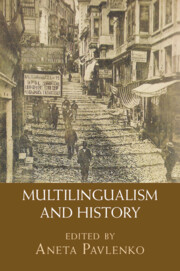Book contents
- Multilingualism and History
- Multilingualism and History
- Copyright page
- Contents
- Figures
- Contributors
- Acknowledgments
- 1 Multilingualism and Historical Amnesia: An Introduction
- 2 Greek Meets Egyptian at the Temple Gate: Bilingual Papyri from Hellenistic and Roman Egypt (Third Century BCE–Fourth Century CE)
- 3 Language Shift, Attitudes and Management in the Roman West
- 4 Languages at War: Military Interpreters in Antiquity and the Modern World
- 5 How Multilingualism Came to Be Ignored in the History of Standard English
- 6 Multilingualism and the Attitude toward French in the Latin Kingdom of Jerusalem
- 7 Why Colonial Dutch Failed to Become a Global Lingua Franca
- 8 How Unique Was Russia’s Multilingual Elite?
- 9 Language Ideology and Observation: Nineteenth-Century Scholars in Northwestern Siberia
- 10 Studying Historical Multilingualism in Everyday Life: The Case of the Habsburg Monarchy in the Nineteenth Century
- 11 Multilingualism and the End of the Ottoman Empire: Language, Script, and the Quest for the ‘Modern’
- 12 “Multilingualism Is Now a Must”: Discourses on Languages and International Cooperation at the Council of Europe
- 13 The Role of the Past in Language Revitalization
- 14 Historic Reenactments in Contemporary Spain: Fiestas de moros y cristianos
- 15 Multilingual Ghost Signs: Dissonant Languages in the Landscape of Memory
- Index
- References
10 - Studying Historical Multilingualism in Everyday Life: The Case of the Habsburg Monarchy in the Nineteenth Century
Published online by Cambridge University Press: 20 April 2023
- Multilingualism and History
- Multilingualism and History
- Copyright page
- Contents
- Figures
- Contributors
- Acknowledgments
- 1 Multilingualism and Historical Amnesia: An Introduction
- 2 Greek Meets Egyptian at the Temple Gate: Bilingual Papyri from Hellenistic and Roman Egypt (Third Century BCE–Fourth Century CE)
- 3 Language Shift, Attitudes and Management in the Roman West
- 4 Languages at War: Military Interpreters in Antiquity and the Modern World
- 5 How Multilingualism Came to Be Ignored in the History of Standard English
- 6 Multilingualism and the Attitude toward French in the Latin Kingdom of Jerusalem
- 7 Why Colonial Dutch Failed to Become a Global Lingua Franca
- 8 How Unique Was Russia’s Multilingual Elite?
- 9 Language Ideology and Observation: Nineteenth-Century Scholars in Northwestern Siberia
- 10 Studying Historical Multilingualism in Everyday Life: The Case of the Habsburg Monarchy in the Nineteenth Century
- 11 Multilingualism and the End of the Ottoman Empire: Language, Script, and the Quest for the ‘Modern’
- 12 “Multilingualism Is Now a Must”: Discourses on Languages and International Cooperation at the Council of Europe
- 13 The Role of the Past in Language Revitalization
- 14 Historic Reenactments in Contemporary Spain: Fiestas de moros y cristianos
- 15 Multilingual Ghost Signs: Dissonant Languages in the Landscape of Memory
- Index
- References
Summary
The chapter explores what type of sources can help us understand multilingualism in the past. Since direct observation and elicitation techniques are not available, tackling the “poor data problem” is one of the key issues in the study of historic multilingualism. The chapter focuses on the late Habsburg Monarchy and its linguistically exceptionally diverse populations. Scholars frequently draw on the ethnographic maps, demographic data, and language laws that have come down to us from historic times to make sense of this diversity. Important as these sources are, they only offer a bird’s eye view of the realm’s multilingualism. Other sources are needed to explore its functioning in day-to-day life in particular communities. The chapter argues that memoirs, late-Habsburg satirical magazines, and criminal court records can all serve this purpose. They afford unique glimpses into everyday life in the past and allow us to reconstruct the workings of historical multilingualism in terms of its social underpinnings and linguistic outcomes.
Keywords
- Type
- Chapter
- Information
- Multilingualism and History , pp. 187 - 204Publisher: Cambridge University PressPrint publication year: 2023
References
- 1
- Cited by

